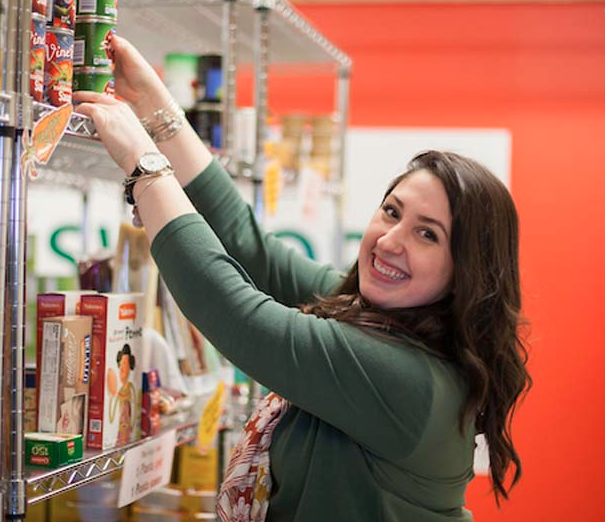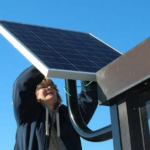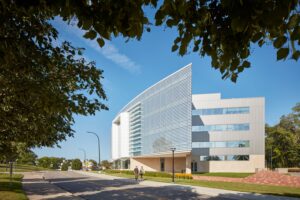
- Kim Kisner
- Education
- 03/28/2023
EMU Leverages Infrastructure and Initiatives Toward Sustainability

Eastern Michigan University approaches sustainability through a systemized framework and a community-derived mindset that together drive several sustainability initiatives and sustainable infrastructure endeavors on campus.
For its sustainability framework, EMU uses the Association for the Advancement of Sustainability in Higher Education (AASHE) and its Sustainability Tracking, Assessment and Rating System (STARS) system and has developed a President’s Sustainability Commission, comprising a broad array of offices and people across the university to develop and execute sustainable practices.
SBN Detroit spoke to Tom Kovacs, chair of the president’s sustainability commission and professor of meteorology and climate in the Department of Geography & Geology, about EMU’s sustainability efforts.
Q: What are some of the recent sustainability initiatives you’ve put into place?
A: First, we are very proud to have completed our STARS certification process and received Bronze Certification.
We know that there is room for improvement, which is what we are working on this year. One of the areas we scored lower on is engagement, so to that end, we are building sustainability information into our orientation for 2023 and also are doing a lot more to let people know the sustainability commission exists and inviting people in to help with our efforts.
We also very recently partnered with a sustainable mobility solution – Spin Scooters – as the exclusive scooter provider on campus which is helping a lot with student and staff transportation.
Another development is a new partnership with EnergySage.
EnergySage provides a marketplace that connects interested parties to vetted installers. You simply list your needs, and the various installers provide you with a quote and basically compete for your business, so you ultimately get the best deal.
There is also an educational component of EnergySage that offers advisors to help work through the options, as well as a full library of resources on clean energy, and how to live more sustainably.
This collaboration helps us improve our STARS ranking and benefits the EMU community so it’s a win-win.
Q: How is the university’s heat powered?
A: We have a 55-ton cogeneration system that is powered by natural gas and produces electricity and steam. The system supplies approximately 98 percent of the heat and 93 percent of the electricity to the 800-acre campus.
The unit will create an annual reduction of 21,305 tons of carbon dioxide (CO2), equivalent to 78.2 million miles driven by an average passenger vehicle – or the preservation of 260 acres of forests.
Q: What are some other examples of campus infrastructure focused on sustainability?

A: We have solar panels installed at bus stops lining the perimeter of campus and one in the middle of campus. The energy from the sun is stored in the battery assemblies to be utilized during the evening hours to keep travelers safe.
We also have a student-led Giving Garden that provides an opportunity for staff, faculty, students, and Ypsilanti residents to grow fresh produce. It’s also used to educate local preschoolers and other students in the area.
There is a new composting effort underway, and the garden provides locally grown food to the Swoops Pantry.
Q: What is the Swoops Pantry?
A: The Swoops Pantry was initiated by a former EMU student and is run by a leadership board of faculty, staff, students, and alumni volunteers. It operates as a sustainable resource for food-insecure students. There is a large stigma involved so they work hard to make things discreet and anonymous.

Similar to Swoops, we also recently initiated an EMU Career Closet that provides apparel for students going on interviews. This is a great resource for those who don’t have the means to shop and purchase extra clothing.
Q: The dining services in EMU dorms are managed by Compass Group’s Chartwells Higher Education Dining Services. What does this mean in terms of sustainable food practices?
A: We shifted to privatized dining about six years ago and work with Compass Group to make dining a more sustainable endeavor. They’ve partnered with local community gardens; they work to incorporate composting; they work to limit waste; and they host a number of events such as Meatless Mondays and Farm to Fork luncheons. They also host a teaching kitchen. We have people from their team who volunteer on our Sustainability Commission, and they will be speaking at our student orientations on sustainability.
Q: You also have an office supply program – Partnering for Sustainability.
A: Yes, in 2019 we partnered with Office Depot. This allows the EMU community to purchase greener office products and select greener options when available. Recycled bags and reusable plastic totes are also used for delivery versus boxes.

Q: What are your areas of focus for the near future?
A: We’ll continue all of our efforts in the initiatives we’ve discussed here and seek to enhance them where appropriate.
And again, coming off of the recent STARS certification process, our big focus is engaging the community in all of these efforts and more to work toward a greener campus and surrounding area.
Be sure to subscribe to our newsletter for regular updates on sustainable business practices in and around Detroit.
Kim Kisner
- All
- Business
- Community
- Education
- Events

ZF Group, a global technology company with its North American headquarters in Northville, specializes in systems for passenger cars, commercial vehicles, and industrial technology. With a focus on next-generation mobility, the company develops solutions that address electrification, automation, and digitalization while aiming to improve safety, efficiency, and sustainability in transportation. SBN Detroit interviewed Anuj Shah, Sustainability Lead, for the Americas, to explore the most pressing environmental challenges in...

The Chip Bag Project, based in Detroit, is a sustainability initiative that upcycles hard-to-recycle snack packaging — particularly chip bags — into insulated sleeping bags for individuals experiencing homelessness. Founded by Eradajere Oleita, the project addresses both environmental waste and housing insecurity by transforming materials like Mylar into practical, thermally efficient solutions. In June, Oleita was among Trelllis’s 30 Under 30, its annual recognition of the brightest young...

PowerPanel, headquartered in Oxford, focuses on sustainable energy technology with a particular emphasis on hot water systems and thermal energy capture. The company designs and manufactures modular solar hybrid systems that integrate both photovoltaic and thermal components into a single unit. Its goal is to offer energy solutions that are more efficient, durable, and economically viable for a range of commercial and industrial applications. SBN Detroit interviewed Garth...







